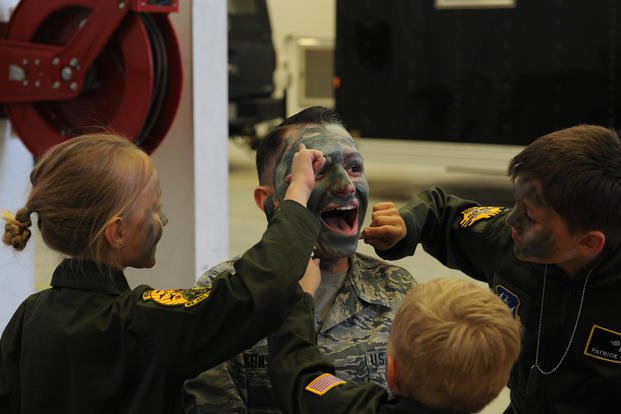Do you have a child who grew up playing with GI Joe, wearing camouflage and playing Army? Maybe it was just a phase or maybe your child wants to serve in the military one day and is determined to do everything they can to prepare -- even at a young age.
If their desire to serve in the military stays strong, consider this a guide for preparing them for what's to come:
Just let them be. If your child is under the age of 10, chances are that they will change their mind a few more times before high school. Wait it out to see whether it is just a passing interest or the desire to serve grows stronger without any outside influence. In the meantime, do research on future options for training, programs and other events to assist with preparing them for their dream job. The links below are a good starting point for the many things to consider during these formative years.
Consider youth programs. Boy/Girl Scouts, Navy Sea Cadets and Young Marines might be good options if you think your child would enjoy some regimented military-like training that involves discipline, physical activity, uniforms and developing skills. If they join the Boy Scouts, challenge them to achieve Eagle Scout, as this would be helpful in the military and officer application process.
Consider sports, martial arts or other group activities (band, theater, music). These types of activities will help your child learn skills from other people (coaches, mentors, instructors) and require them to work with others to perform tasks and learn valuable team-building skills.
Time to start training. Adding in fitness training is a smart idea as your child approaches their teens. Basic calisthenics and a variety of endurance activities are a great way to build a foundation of fitness that will enhance military preparation for fitness tests and actual training one day. It's a good idea to add activities like running and swimming to the overall fitness program. If your young teen needs to lose weight, add in non-impact activities to reduce impact injuries such as shin splints and joint tendinitis. Beginner running programs should be minimal. Start slow and increase distance in gradual increments.
Learn important skills. Encourage your child to learn how to swim, learn CPR and take a lifesaving course. If they enjoy medical training, have them take an EMT course and volunteer at a local fire department in their later teens.
In high school. Encourage academic challenges and have them get involved in group activities. Whether it is sports, band, theater, community service clubs or Navy JROTC, Army JROTC, or Air Force JROTC, there are options that will help build teamwork and leadership skills. These activities will help them determine whether they should consider college and/or officer training programs through the U.S. Military Academy, Naval Academy, Air Force Academy, Coast Guard Academy or Merchant Marine Academy. In addition, the ROTC (Army ROTC, Navy/USMC ROTC and Air Force ROTC) programs at many colleges offer similar educational scholarships and military leadership training programs.
Joining the military. After high school, they can choose to enlist at 18 years old (17 with a guardian's signature) or wait a few years and get college or job experience before enlisting. Just because the window to enlist begins at 17 does not mean you have to join then. You have until 35 years old in the Army, 34 in the Navy, 28 in the Marines, and 39 in the Air Force.
Some special-ops programs will cut the age limit to less than the military branch max age, but you typically have at least a 10-year window to join special-ops programs as well. In other words, do not be in a hurry to join; join when you are ready to serve.
Finally, your child should be taking the initiative to learn about the journey forward. Make sure they are aware of the recruiting process in entering the military as enlisted and all the requirements needed to enter the military as an officer. Both require significant research.
Trust but verify everything that is told to you by any recruiter. Try to find an advocate who has been through the recruiting process before and make sure you read everything you sign. The last thing you want to do is join the military and do a job for which you did not mean to sign up.
Stew Smith is a former Navy SEAL and fitness author certified as a Strength and Conditioning Specialist (CSCS) with the National Strength and Conditioning Association. Visit his Fitness eBook store if you’re looking to start a workout program to create a healthy lifestyle. Send your fitness questions to stew@stewsmith.com.
Want to Learn More About Military Life?
Whether you're thinking of joining the military, looking for fitness and basic training tips, or keeping up with military life and benefits, Military.com has you covered. Subscribe to Military.com to have military news, updates and resources delivered directly to your inbox.
















